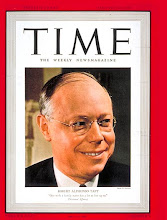
How things have changed in two short years.*
In November 2008 we were told conservatism was dead and the Republican Party was on its way to Whig status. Ragin' Cajun James Carville boastfully predicted 40 years of Democratic governance.
Maybe not.
Now conservatism is in an ascendancy. The Republicans are back and have learned that the reason they were fired in the first place was because of all that spending. Now that Republicans are back in the House, they can get to work on repealing Obamacare, privatizing Social Security, and ending the welfare state.
Maybe not.
For all the chatter, there isn't anything even broadly revolutionary about this election. There might be a few upsets and a few unapproved candidates might survive running the gauntlet, but this Republican Congress will likely resemble the ones that disappointed from 1994-2006.
The mistake made by rose-spectacled Republicans comes in thinking that a change of majority parties makes much of a difference beyond the name plates and seating arrangements.
Time magazine just put "Party Crashers" Rand Paul, Christine O'Donnell, Marco Rubio, and Meg Whitman on its election issue cover. That Bush Republican Marco Rubio and former eBay CEO and billionaire Meg Whitman are somehow considered "a new breed of Republicans" tells us enough about what is considered "Tea Party" these days.
Too much buzzkill?
The first reason for skepticism is that there has not been a serious philosophical shift, nay even a debate within the GOP.
One might argue that support for the bank bailouts or President Obama's stimulus became a litmus test since it resulted in the scalp of Bob Bennett and the defection of Arlen Specter. But that anyone can support the promotion to Speaker of the House for bailout leader John Boehner suggests that the party leadership won't have to pay for their sins.
The one issue that got Republicans kicked out in the first place, foreign policy and the disastrous experiments in Middle Eastern nation-building, has been a non-issue in this election cycle.
Republicans have convinced themselves and probably convinced a lot of voters that the real reason they got booted was because they spent too much. The party's recent emphasis on economic issues would be a step in the right direction if it was rooted in anything besides partisanship. Like the kid who got spanked for sticking his hand in the cookie jar, these Republicans are only sorry they got caught.
Secondly, there is nothing in this election to suggest confidence in Republicans -- only that Democrats failed and voters had nowhere else to turn.
Republican victories this year are also consistent with historical precedent. In America's duopoly, the ruling party traditionally loses big in the first midterm. One party fails and the other one gets their chance to do . . . something.
In 1954, during Dwight Eisenhower's first term as president and the first such Republican in 20 years, the GOP lost 18 seats in the House. Reagan's Republicans got routed in 1982 while the economy was still sour. Bill Clinton had large majorities in Congress in 1994 before losing a whopping 54 seats. With the memory of 9/11 still fresh, George W. Bush's GOP temporarily broke the trend by adding 8 seats at midterm.
Since the Republicans have gone into exile, there has been no urgency to address issues. Republican identity for the past two years has been wrapped up in opposition to the Democratic president. It's not because he's black. It's because he's a Democrat.
The new Republican ascendance has nothing to do with a re-birth of conservatism or faith in the GOP and everything to do with a Democratic ruling majority that didn't delivery what it promised despite overwhelming majorities.
The Republicans' position as the majority party in Congress doesn't preclude them from relinquishing their title as the Party of No. They can still oppose President Obama at every turn for the next two years but that won't mean they stand for anything.
The Republican Party doesn't need to be restored to power. It needs some fresh ideas and new leaders.
And if Barack Obama can defy conventional wisdom and make a Clintonian move to the Center, who will he and the rest of us have to thank for providing no genuine alternative?














